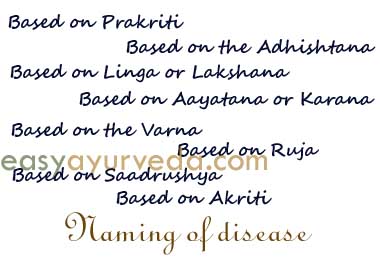Ayurvedic Principles Of Naming Disease: Vyadhi Namakarana Siddhanta
Article by Dr Raghuram Y.S. MD (Ay) & Dr Manasa.
The scientific approach toward understanding the disease process is very evident in Ayurveda. While naming the disease, the ancient Ayurvedic scholars adopted methodical approach.
Table of Contents
Ayurvedic principles of naming
The diseases have been named and classified in Ayurveda based on the below mentioned principles –
Prakruti
Based on Prakriti (Sannikrishta karana or proximal causes of a disease) –
The doshas are the closest causes for the causation of a disease, since they produce the diseases of the body and mind.
Diseases caused by Vata – Vatarakta (gout), Amavata (Rheumatoid arthritis), Udavarta (upward movement of Vayu), Aadhmana (distension of abdomen), Kampavata (tremors), Vatakantaka (sprains, spur) etc
Diseases caused by Pitta – Raktapitta (bleeding disorders), Paittika Jwara (fever caused by pitta), Paittika Atisara (diarrhoea caused by vitiated pitta), Paittika Grahani (Mal-absorption caused by vitiated Pitta), Pittaja Arsha (piles caused by vitiated pitta), Paittika Chardi (vomiting caused by vitiated Pitta), Paittika Apasmara (epilepsy or memory dysfunctions caused by vitiated Pitta) etc

Diseases caused by Kapha – Kaphaja Jwara (fever caused by vitiated kapha), Kaphaja Atisara (diarrhoea caused by vitiated kapha), Kaphaja Grahani (sprue or mal-absorption caused by vitiated kapha) etc
Adhishtana
Based on the Adhishtana (site of manifestation of disease) –
Grahani – disease manifested in grahani or duodenum
Charmakeela – keloids caused in the skin (charma)
Svara bheda – hoarseness of voice (svara)
Paksha vadha – loss of functions in half side of the body (paksha) i.e. hemiplegic or paralysis
Gridhrasi – disease affecting gridhrasi nadi or sciatic nerve i.e. Sciatica
Amsa shosha – thinning of amsa or scapular region (wasting of scapular muscles)
Manya stambha – stiffness of manya or nape of the neck
Hanu graham – stiffness or rigidity of hanu or mandible or lower jaw (lock jaw)
Hrid roga – disease of hridaya or heart (cardiac disorders)
Aamashaya Shula – Pain in aamashaya (stomach)
Pakwashaya Shoola – Pain or colic in Pakwashaya (colon)
Shiraha Shula – Pain in shira or head (headache) etc
Lakshana
Based on Linga or Lakshana (signs and symptoms of the disease) –
Atisara – excessive discharge of liquid stools (diarrhoea)
Kasa – cough
Hikka – hiccough
Prameha – repeated urination in excessive quantity and turbid form (urinary diseases, diabetes)
Jalodara – accumulation of jala or water or fluids in the belly (udara) i.e. ascitis
Dhanu stambha – body bending like an arch (tetanus)
Urustambha – stiffness of thighs
Mutrotsanga – obstruction of urine
Mutrashmari – formation of stones in urinary passages etc
Karana
Based on Aayatana or Karana (causative factors of the disease) –
Krimija Hridroga – Heard disease caused by micro-organisms
Sahasajanya Rajayakshma – Wasting diseases caused due to excessive exercise
Madhyaja Trishna – Excessive thirst caused due to consumption of excess alcohol
Shramaja Shwasa – dyspnoea or shortness of breath caused by exhaustion
Pureeshaja udavarta – upward movement of vayu by forcibly controlling the urge for defecation (as a long-standing habit)
Mruttikajanya Pandu – Anaemia caused due to excessive consumption of mud etc
Varna
Based on the Varna (Colour changes expressed by the disease process) –
Haridra meha – urinary diseases in which the colour of urine resembles the colour of turmeric
Kala meha – urinary diseases in which the colour of the urine is black
Pandu – disease identified by pallor
Kamala – yellowish discolouration of eyes, skin etc (jaundice) etc
Ruja
Based on Rujaa (pain and nature of pain) –
Shula – pain or colic in which pain resembles as if pierced by a conch
Janu bheda – splitting pain in the knee
Gudarti – cutting pain in the anal region
Arsha – disease which troubles you like ari or enemy (piles or haemorrhoids)
Daha – disease charecterized by burning type of pain
Hrit drava – Hrudrava – disease in which the heart beats are felt (palpitations)
Akshi shula – pain in the eyes
Prushta graham – catching or gripping pain in the back
Vak sanga – obstruction of voice etc
Saadrushya
Based on Saadrushya (similarity) –
Manjishta Meha – urinary diseases in which the colour of urine resembles the colour of manjishta (Rubia cordifolia)
Ikshu meha – urinary diseases in which the colour of urine resembles sugarcane juice etc
Akruti
Based on Akriti (shape) –
Masurika – eruptions resembling the shape of masura or pink lentils (chicken pox)
Vepathu – tremors or shaking of limbs as in Parkinson’s disease
Vaipadika – cracks or fissures in the sole of the foot, cracked heels
Dhanustambha – body bent and resembles a bow (tetanus) etc
Click to Consult Dr Raghuram Y.S. MD (Ayu)








